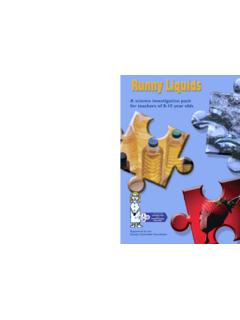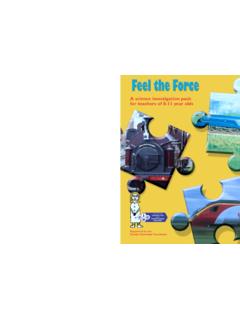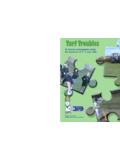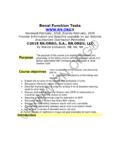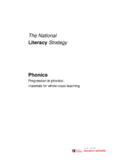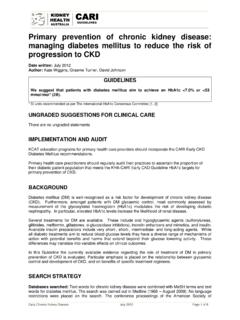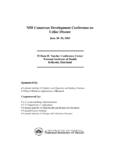Transcription of expected progression in working - CIEC
1 The posters were very well received when I used them in a staff INSET to identify the expected progression in working scientifically! Each class now has a copy on their science adapted them slightly, to fit our curriculum planning, and they are laminated and can be found on the children s tables. They are used as targets for learning and year 1 and 2 love them especially. I also used the statements to create Science I can tracking sheets that are consistent with maths and have tried the poster with my class for one of the activities and it worked really well. It was easy for the Year 1 class to use. Next term I will build it in to my planning. I will be taking the first staff meeting of next term and I m going to propose that we roll it out throughout the school. working Scientifically in the primary Classroom: progression of Enquiry Skills IntroductionThis booklet has been produced to help teachers understand how to work scientifically within the primary science curriculum for England.
2 Each page contains a summary of information intended to enable teachers to:plan science lessons during which children can show progress in their learningensure continuity and progression of essential enquiry skills differentiate activities and add challenge for more able children make accurate assessments, and facilitate high quality peer and notes below provide guidance for teachers using and sharing the posters and progression grids in their own school and beyond. We do hope that these are useful to as many colleagues as possible in English primary schools, and would appreciate feedback on how they are used to Encouraging children to work scientificallyThere are three aims in the English primary science curriculum, to ensure that all pupils:develop scientific knowledge and conceptual understanding through the specific disciplines of biology, chemistry and physics develop understanding of the nature, processes and methods of science through different types of science enquiries that help them to answer scientific questions about the world around them are equipped with the scientific knowledge required to understand the uses and implications of science, today and for the future.
3 This guidance provides support particularly for the second of these aims. In order for primary school children to operate as successful scientists, they should be taught a wide range of essential enquiry skills. These skills should build upon earlier opportunities they have had to play, explore, create, engage in active learning, and think critically in the Early Years Foundation carefully examining the statutory requirements for working Scientifically at Key Stage One, Lower Key Stage Two and Upper Key Stage Two, it is possible to create a list of generic science enquiry skills common to all children across the primary age phase:Asking questionsObserving and measuringPlanning and setting up different types of enquiriesIdentifying and classifyingPerforming testsGathering and recording dataUsing equipmentReporting, presenting and communicating data/findingsBy further teasing apart the statutory requirements and non-statutory notes and guidance for working Scientifically, it is possible to see subtle differences in the way that each skill is described as children increase in age and ability.
4 It is important that teachers understand the progression route for each skill to enable them to plan high quality science lessons. The National Curriculum in England Key Stages One and Two framework document September 20 3, Department for Education working Scientifically: progression of Enquiry Skills1 progression of skills: grids explained Early Years Foundation Stage to Key Stage One progression of Enquiry Skills Early Years Foundation Stage to Key Stage One, is a succinct overview of science enquiry for our youngest scientists. Teachers can use this grid to see how emergent science skills act as precursors to the statutory requirements of working Scientifically found in the English National Curriculum for Science for Key Stage One. The document has been separated into rows of distinct skills so that teachers can easily understand the expected standards as well as plan for differentiation and progression within each skill.
5 The information in italics shows where each statement comes from; whether it is an Early Learning Goal or a Characteristic of Effective Learning found in the non-statutory guidance Development Matters .Teachers could also use this document to formulate working Scientifically learning objectives and ensure that all areas of enquiry have been taught throughout the academic year. It could be used for both formative and summative assessment purposes whereby teachers highlight particular skills that have been achieved by either individuals or groups of children and then use this information to target areas of weakness as well as to indicate next steps in learning. Note: Pupils are not expected to cover each aspect for every area of study. Key Stage One to Key Stage TwoProgression of Enquiry Skills Key Stage One and Two is an organised summary of the statutory requirements and non-statutory notes and guidance for working Scientifically from Years to 6.
6 It has the same purpose as the EYFS KS grid and will enable teachers to understand and make quick reference to the expected national standards across the full primary age range. Key Stage Two to Key Stage ThreeProgression of Enquiry Skills Upper Key Stage Two to Key Stage Three has the same purpose as outlined above, with a focus on enabling teachers to see how the skills pupils learn at primary school can be extended beyond Year 6. Upper Key Stage Two teachers can use this information to create activities which challenge their most able children and make purposeful links to the additional mathematics required to carry out higher level science. working Scientifically PostersA poster is provided for each of the following age ranges:Early Years Foundation Stage Lower Key Stage Two Key Stage One Upper Key Stage Two The information from the grids has been converted into child-friendly I can statements and presented in a format that may be used for both peer and self assessment.
7 Teachers may wish to replace the poster image with photographs of individual children in their class. Each child can use their own poster and personalise their learning by identifying the enquiry skills being taught in weekly science lessons. They could highlight, tick or date a skill when they feel they have achieved the expected standard of attainment. Teachers can use the posters as a quick and easy reference for age appropriate expectations when planning enquiry activities. The statements have been written in hierarchical order around the posters so that it is possible to refer to an earlier or later age group s poster to help with differentiation and challenge. This order is not intended to be explicit to children, and should therefore avoid labelling or levelling themselves or each Scientifically: progression of Enquiry Skills2 Stage OneShow curiosity about objects, events and people Playing & ExploringQuestions why things happen Speaking.
8 30-50 monthsExplore the world around them and raise their own simple questionsEngage in open-ended activity Playing & ExploringExperience different types of science enquiries, including practical activitiesTake a risk, engage in new experiences and learn by trial and error Playing & ExploringBegin to recognise different ways in which they might answer scientific questionsFind ways to solve problems / find new ways to do things / test their ideas Creating & Thinking CriticallyCarry out simple testsDevelop ideas of grouping, sequences, cause and effect Creating &Thinking CriticallyKnow about similarities and differences in relation to places, objects, materials and living things ELG: The WorldUse simple features to compare objects, materials and living things and, with help, decide how to sort and group them (identifying and classifying)Comments and asks questions about aspects of their familiar world such as the place where they live or the natural world The World: 30-50 monthsAsk people questions and use simple secondary sources to find answersClosely observes what animals, people and vehicles do The World 8-20 monthsUse senses to explore the world around them Playing & ExploringObserve closely using simple equipmentWith help, observe changes over time Make links and notice patterns in their experience Creating & Thinking CriticallyWith guidance, they should begin to notice patterns and relationshipsChoose the resources they need for their chosen activities ELG.
9 Self Confidence & Self Aware-nessHandle equipment and tools effectively ELG: Moving & HandlingUse simple measurements and equipment ( hand lenses, egg timers) to gather dataCreate simple representations of events, people and objects Being Imaginative: 40-60+ monthsRecord simple dataAnswer how and why questions about their experiences ELG: UnderstandingMake observations of animals and plants and explain why some things occur, and talk about changes ELG: The WorldUse their observations and ideas to suggest answers to questions Talk about what they have found out and how they found it outDevelop their own narratives and explanations by connecting ideas or events ELG: SpeakingBuilds up vocabulary that reflects the breadth of their experience Understanding: 30-50 monthsWith help, they should record and communicate their findings in a range of ways and begin to use simple scientific language progression of Enquiry Skills from Early Years Foundation Stage to Key Stage OneWorking Scientifically.
10 progression of Enquiry Skills3 progression of Enquiry Skills from Key Stage One to Key Stage TwoKey Stage 1 Lower Key Stage 2 Upper Key Stage 2 Explore the world around them and raise their own simple ques-tionsRaise their own relevant questions about the world around themUse their science experiences to explore ideas and raise differ-ent kinds of questionsExperience different types of science enquiries, including practi-cal activitiesShould be given a range of scientific experiences including differ-ent types of science enquiries to answer questionsTalk about how scientific ideas have developed over timeBegin to recognise different ways in which they might answer scientific questionsStart to make their own decisions about the most appropriate type of scientific enquiry they might use to answer questionsSelect and plan the most appropriate type of scientific enquiry to use to answer scientific questionsCarry out simple testsSet up simple practical enquiries, comparative and fair testsRecognise when a simple fair test is necessary and help to decide how to set it up Recognise when and how to set up comparative and fair tests and explain which variables need to be controlled and whyUse simple features to compare objects.

